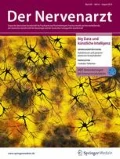Zusammenfassung
Berichtet werden erste Ergebnisse einer klinischen und katamnestischen Untersuchung zur Effizienz einer intensiven ambulanten Entwöhnungstherapie bei Alkoholkranken. In die Studie konnten 102 Patienten eingeschlossen werden.Die durchschnittliche Dauer der Alkoholabhängigkeit betrug 15 (±9) Jahre, die letzte durchschnittliche Trinkmenge 193 g reiner Alkohol.
Die Haltequote betrug 72,5%, 18 der 25 Abbrüche erfolgten wegen Alkoholrückfällen. Rückfällige Therapieabbrecher wiesen im Mittel eine längere Alkoholbelastung und signifikant mehr Vorbehandlungen als Therapiebeender auf, berichteten bei Aufnahme auch über ein signifikant stärkeres Alkoholverlangen. Ferner erreichten sie auch bei Therapiebeginn signifikant höhere Summenscores im BDI (Depressivität) und STAI (Ängstlichkeit). Für die katamnestischen Zeitpunkte 6 bzw.12 Monate nach Therapiequote wurde eine hohe Ausschöpfquote mit ca.90% erreicht. Die Abstinenzquote beträgt 6 Monate nach Therapieende 64%.Über den gesamten 12-Monats-Katamnese-Zeitraum waren 56% der Patienten abstinent, 14% gebessert und 30% rückfällig.Therapeutische Implikationen dieses befriedigenden Therapieergebnisses werden diskutiert und der heutige Kenntnisstand zur Effizienz ambulanter Therapien bei Alkoholabhängigkeit dargestellt.
Summary
First results of a clinical and catamnestic investigation are reported for the efficiency of a highly structured outpatient therapy with alcohol-dependents.One hundred and two patients were included in the study.Of the patients,60% were male and 40% female. The average age was 45 years (±8).The average duration of alcohol dependence amounted to 15 years (±9), and the last average quantity of pure alcohol drunk was 193 g.Twenty-seven per cent of the patients had completed inpatient therapies in the past.Treatment retention amounted to n=74 (72.5%), and 18 of the 25 dropped out because of alcohol relapse.On average, relapsed dropouts indicated a longer abuse of alcohol and significantly more pretreatments than completers, and they also reported significantly stronger craving for alcohol (measured with the OCDS).Furthermore, they also achieved significantly higher total scores in the BDI (depression) and STAI (anxiety) scales at the beginning of therapy. At 6/12-month follow-ups, 90%–95% of the patients were successfully located and interviewed. Analyses revealed that 64% of the patients were still abstinent at 6-month follow-up evaluation, and 56% had remained abstinent until 12-month follow-up. Therapeutic implications of these satisfying therapy results are discussed, and the current knowledge on the efficiency of outpatient therapies is presented.
Author information
Authors and Affiliations
Additional information
Dr.M.Bottlender Psychiatrische Klinik und Poliklinik, LMU München,Nußbaumstraße 7, 80336 München, E-Mail: bottlend@psy.med.uni-muenchen.de
Rights and permissions
About this article
Cite this article
Soyka, M., Hasemann, S., Scharfenberg, C. et al. Prospektive Untersuchung zur Effizienz der ambulanten Entwöhnungstherapie bei alkoholabhängigen Patienten . Nervenarzt 74, 226–234 (2003). https://doi.org/10.1007/s00115-002-1398-9
Issue Date:
DOI: https://doi.org/10.1007/s00115-002-1398-9

